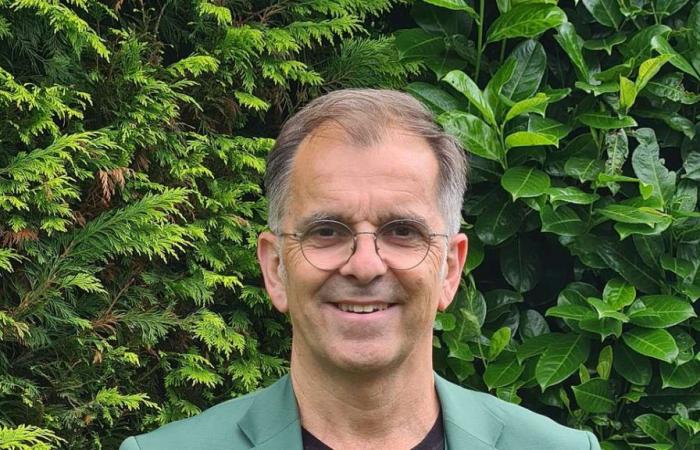Stand: 29.06.2024, 10:00 a.m.
Von: Laura Oehl
PressSplit
Dr. Nikos Stergiou has been chief physician of internal medicine at the Asklepios Clinic in Seligenstadt for two decades. In an interview, he talks about the development of the clinic and the reform plans of Health Minister Lauterbach.
Seligenstadt – Dr. Nikos Stergiou has been a doctor for more than 30 years, and for 20 years he has been chief physician of the internal medicine department at the Asklepios Clinic in Seligenstadt. In an interview, the 58-year-old talks about the changes of the past two decades and explains how he would save the health system.
You have been chief physician in Seligenstadt for 20 years. What does that mean to you?
I would say that I would still be working in the same place today as one of the longest-serving chief physicians, was not foreseeable. Firstly, because 20 years ago it was not yet clear that this location would be retained – despite all the promises that were made when the hospital was transferred from district responsibility to private ownership. It was also unclear whether the concept that I was able to develop for my area would really work. The fact that it worked shows that what I did was obviously not so wrong.
What were you planning to do back then?
Because I know Seligenstadt, I thought about what the population needs. What treatment priorities are necessary? This is primarily emergency care, which must be maintained. The broad range of services available to provide initial care to patients, regardless of their medical condition, should be a priority. The first thing we did was to draw up a plan for how we wanted to develop over the next five to ten years. I was sure that it would take five years to gain a foothold, but ten to change something. And the most important thing is that I found allies for this. Because the team is our strength, never an individual. This enabled us to develop the other priorities: gastroenterology – in other words, that many people trust us when it comes to endoscopy procedures – the new intensive care unit, geriatric medicine with geriatrics, neurology and stroke patients, cardiology, but also the palliative care unit. All aspects of a hospital that you know you can go to because you will receive the best initial or even complete treatment. Together with our partner clinic in Langen, we are also a teaching hospital for the University of Frankfurt. I am proud of that.
I believe that the next generation of doctors must be better than I was. And they will only do that if they learn everything from me and then continue their education.
You are also the founder of the “Training Academy” for internal medicine. What is behind it?
In 2011, the “Training Academy” was the first training concept nationwide that you enter as an assistant doctor and know exactly when you can be trained as an internist and gastroenterologist and what skills are required for that. I established it because I believe that the next generation of doctors must be better than me. And they will only do that if they learn everything from me and then continue their training. And if we want to convey that, it can only be done with structured teaching. It was important to me that we could train doctors to become specialists and thus perhaps arouse interest in settling here in the eastern district. Appreciation and proper training and further education are the be-all and end-all for doctors. And keeping doctors here – whether as a resident colleague or as a hospital doctor – is the decisive factor.
What does the Seligenstadt location mean to you?
Seligenstadt means home to me. And the hospital means the medical care I receive at home. Asklepios was prepared to invest here and bring about change. In the 19 years between my internship and my first day as chief physician, practically nothing had changed here, but in the past 20 years this clinic has changed completely. And we financed our new building ourselves, for example, because the company reinvested the profits we made. This is also an appreciation for the employees and our patients.
Surgery in old age is not without risk
How have the patients here changed during your time as chief physician?
At the beginning, we reduced the age structure a little. With endoscopy and gastroenterology, younger people were also interested in being treated. Now the average age is actually going up. Also because the baby boomers are now reaching the age at which people are treated for illnesses. As far as internal and neurological diseases are concerned, we see the full spectrum of clinical pictures, as we have learned. In the past two years, we have seen a slightly increased incidence of tumor diseases in initial diagnosis. This is certainly due to the fact that not as many preventive examinations were carried out during the corona pandemic. The responsibility that younger people have for older family members has also increased. And the disintegrating family structures, the fact that we now have greater distances between parents and children, also mean that people are completely overwhelmed with the decisions for their relatives. I did not experience this 30 years ago.
But today people are also getting older.
Exactly. And of course you think – and I’m no exception – that it will just go on like this forever. But you have to know what it means to receive certain treatments as a senior citizen. Operations in old age are not without risk, and you can’t expect people to be back to their old self after two or three days. We have to adapt to this, and that’s why we have geared the clinic a little towards geriatric medicine, because that corresponds to the population structure in the region.
More cooperation in the hospital
Do you want to focus on this even more in the future?
Yes. We often have clinical pictures that overlap with neurological and internal diseases – for example, a stroke – but also with surgical diseases. I imagine that the collaboration between these areas will be intensified. And this involves diseases that are more common in older people. It may be that 80 feels like the new 60, but the body needs to be considered from a special perspective from the age of 70. I believe that we are excellently prepared for this phase. And it is also good for you as you get older and know that your colleagues are well trained.
In the past, you have also expanded outpatient care. Do you plan to continue doing so?
Yes. I hope that we can direct patients who come to the emergency room so that they do not have to be admitted as inpatients. They should also be able to receive outpatient care for heart, gastrointestinal or lung problems. But this must also be affordable. That means that the clinic and the doctors in private practice must work together, but also accept that everyone has to take on a little of the other’s work. And I would be pleased if this was reimbursed by the funding bodies – and not with a flat rate that is below the coverage limit. Then a pre-selection would take place in the central emergency room as to what needs to be inpatient and what can be treated as an outpatient. At the same time, however, we also have to discipline the patients.
Many people do not understand their own bodies and do not know what they can expect from them. If I were Minister of Health, I would pay particular attention to this.
In what way?
We have to make it clear to them that not everything works around the clock. Patients need to be informed and trained early on, which means that they need to know what they can expect from the health system and its structure. Who knows how a doctor’s office works? How a hospital works? How our system is financed? My body: how does it work? Many people don’t understand their own bodies and don’t know what they can expect from them. If I were health minister, I would pay particular attention to this: comprehensive, age-appropriate health education in schools, integrated into grades one to nine! That is the only way to save the health system. That would be revolutionary. Anything else is just tinkering.
Sounds like you are not convinced about the planned hospital reform.
It is important that we remain an emergency location with the appropriate focus areas and continue to provide good medical care close to home. For particular illnesses, there are specialized specialist centers and university hospitals. Of course, we also have to have the appropriate specialist qualifications and maintain certain structures. But I believe that when a patient is in need, they must be treated in the best possible way, and looking for a specialist is the last thing they want. That is why I do not necessarily agree with what this health reform makes us believe is sensible. Planting a tree today that I know I will never sit in its shade would be far-sighted, good politics for me. (The interview was conducted by Laura Oehl)






